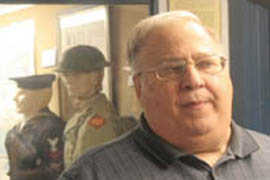Dear Mom and Dad, Love From Vietnam by Joe Abodeely | Books in Review
 Every Vietnam War story has value, even the ones you have heard before. Repetition produces truths. Recently, I read three autobiographies by soldiers who experienced combat in Vietnam during the 1968 Tet Offensive. The best book was whichever one I was reading—the most recent being Dear Mom and Dad, Love from Vietnam (282 pp., $20, paper) by Joe Abodeely, a lieutenant back in the day.
Every Vietnam War story has value, even the ones you have heard before. Repetition produces truths. Recently, I read three autobiographies by soldiers who experienced combat in Vietnam during the 1968 Tet Offensive. The best book was whichever one I was reading—the most recent being Dear Mom and Dad, Love from Vietnam (282 pp., $20, paper) by Joe Abodeely, a lieutenant back in the day.
Abodeely’s memory relies heavily on daily journal entries he wrote in-country and long letters he sent to his parents at least weekly. In this memoir he reflects on that material.
He led a platoon in the 1st Cav for five-and-a-half month before transferring to a staff job. Abodeely recorded his proudest achievement in his journal: “Well, I did it. I went through my tour in the field and never lost a man. None killed.”
Abodeely and his always-undermanned platoon engaged in air assaults, sweeps, patrols, ambushes, search and destroy, and search and clear missions, and one time escaped after being surrounded. They “walked in on Highway 9, where no one before could travel because of ambushes” as the first replacements for besieged Marines at Khe Sanh. Shortly thereafter, his platoon was airlifted into the A Shau Valley to support Operation Pegasus.
Often in Vietnam War books, the big picture tends to repeat itself; therefore, vignettes and turns of phrase fascinate me. Abodeely nicely filled those squares. For example: “In a firefight, you did not see a person shooting at you—bushes shot at you. It was ominous. It was as if the NVA were ghosts.”
And: “My point man was a guy we called ‘Hippy.’ He was a lanky guy and had a peace symbol on his helmet. He found the machine gun and an NVA helmet and a bag of raw opium. The NVA used opium for medicinal purposes. I told Hippy to take the bag to turn it in. I never checked to see if he did.”
Abodeely watched an operations officers carrying a dead NCO and reported: “Before he set the dead soldier down on the ground, the body started regurgitating—the involuntary action of the body after death. I had never seen that before. That was another reminder of my mortality.”
Regarding prisoners, Abodeely noted: “First and third platoons captured some VC. The interrogators beat the hell out of the VC who confessed.”

Joe Abodeely at the Arizona Military Museum
Yet he also felt compassion. After an ARVN soldier tortured a young mother suspected of being a VC by kicking her in the face, crushing her milk-filled breasts, and rubbing chili peppers into her eyes, Abodeely took control and returned the baby to the woman. “We moved out with 38 refugees interspersed with the troops, ” he writes. “The ‘VC’ girl was falling behind, my platoon sergeant yelled to me that she was: I just let it go. I don’t know if she was a Vietcong, but I thought she had suffered enough.”
Life changed significantly for Abodeely after he switched to S-4 Logistics. He describes his job as “requisitioning, scrounging, and stealing” to obtain material for new buildings at Camp Evans in I Corps. He spent his last two months at Quan Loi, a III Corps hot spot near the Cambodian border. Working on S-3 base defense and landing zone duties, he experienced the war from a new perspective. When half of his former company became casualties in one afternoon, he developed a hint of a political conscience.
The other books about 1968 in Vietnam I mentioned are reviewed on these pages: Gray Horse Troop: Forever Soldiers by Charles Baker (a major) and My Story: Vietnam 1968, 196th Light Infantry Brigade by Gary Lyles (a sergeant).
–Henry Zeybel
